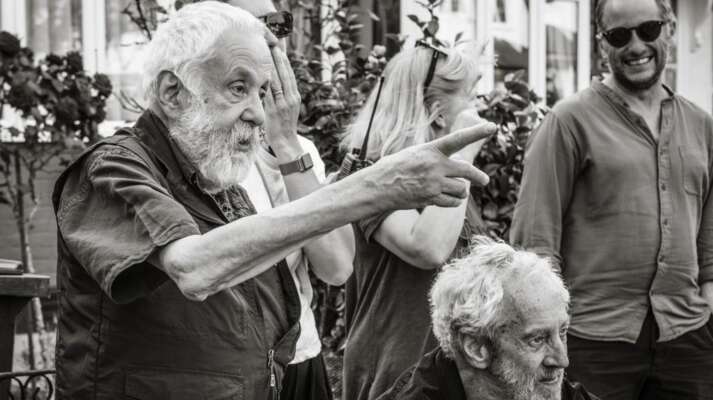Actors We Love: Bryan Cranston
An Actor of Real Complexity
Actors We Love: Bryan Cranston
Written by Peter Bowen
In Jay Roach’s historical drama TRUMBO, Bryan Cranston plays the title character, the acclaimed Hollywood screenwriter whose life and career was derailed for more than a decade after being blacklisted in 1947. The story follows Trumbo’s remarkable trajectory, from being MGM’s most valued screenwriter to his persecution by the House Un-American Activities Committee, to his struggle to regain his name and career by working secretively for years, often taking pennies on the dollar for screenplays that would go on to win Academy Awards. Above all, TRUMBO tells of one man’s passion and perseverance, both qualities that Cranston has exhibited in his own career. When casting TRUMBO, Roach highlighted Cranston’s commitment––both to the characters he plays and the projects he takes on. “Whether it’s Breaking Bad or his Tony-winning turn as Lyndon Johnson [in Broadway’s All the Way] or even as the dad in Malcolm in the Middle, Bryan Cranston demonstrates an intensity that works for Dalton Trumbo,” Roach notes. “He captures Trumbo’s fire, intelligence and self-righteousness and manages to be as charming, entertaining and funny as the real man was.” As an actor, Cranston also reflects Trumbo’s utter professionalism. Starting in the early ‘80s, Cranston appeared in numerous TV shows, films and commercials, bringing something unexpected to every role he took on. But he also took something away from every character––a particular insight into human nature to use for some future project. Project by project, Cranston built not only a professional fan base but also a psychological repertoire that enables him to give each new character depth and humanity. His 1996 spot as a homeless man on Diagnosis Murder earned him the praise of Dick Van Dyke: “I haven’t seen anyone that good on the show.” His stint as a smarmy dentist on Seinfeldremains for many one of most unforgettable turns on a show filled with memorable cameos. Jason Alexander, who became one of Cranston’s good friends, explained to The New Yorker what makes the actor’s performances so noteworthy: “his strongest card is complexity, where you can’t figure out what he represents until he gradually reveals himself.” For TRUMBO’s producer Janice Williams, “Bryan is able to play contradictory characters with ease. He has deep layers of sadness and righteousness. He brought everything that was needed to the role.”
 Malcolm In The Middle
Malcolm In The Middle
Father's Day
In 1999, Bryan Cranston walked into an audition for a new sitcom called Malcolm in the Middle. Earlier that week, Cranston had missed out on parts for sitcoms for NBC and the WB. But after reading the script about a genius boy stuck in a large family run by a dictatorial mom, Cranston crafted a specific strategy for his audition. “She’s tough, so why don’t I start doing the opposite? She’s not afraid of anything so Hal should be completely fearful. She’s insightful. So Hal is obtuse,” Cranston explained to IFC.com. “I started drawing those opposites and the character started to come together.” His plan worked so well that not only did he get cast, but also the show’s creator, Linwood Boomer, expanded the part. “It was a genius way to make an underwritten part work,” Boomer told The New Yorker. “By the third episode, we realized we had to do a lot more writing for the guy.” As the doofus Dad proved more lovable and loony with each episode, Cranston’s unique talents began to shine through. “There are a lot of dumb actors that are pretty brave, and there are a lot of smart actors who are sophisticated,” Boomer observed. “Bryan is one of the few that manages to combine both of those things. I think that's what makes him so exciting to watch." During Malcolm’s six-year run, Cranston gave audiences a lot to watch, from mad dancing in his tighty whities to being swarmed by bees to re-igniting the power walking craze. Indeed Cranston’s willingness to push the boundaries inspired a writers’ room game called “What won’t Bryan do?” a contest that devised more and more outrageous gags for Cranston to do. While Cranston told the Guardianthat “Dick Van Dyke influenced me a lot––you know, his physical comedy and his ability to be loose in his body,” the actor also devised his own unique style, a manner of moving that could express as much through hysterical gestures as it could through terrifying stillness. Looking back, one can easily see in Hal the traces of Cranston’s skill in being able to fully embody a character, a talent for which the actor received three Emmy nominations for Malcolm in The Middle. Entertainment Weekly would go on to name the show one of the “New TV Classics.”
 Breaking Bad
Breaking Bad
Becoming a Cultural Icon
Bryan Cranston as Breaking Bad’s Walter White has become one of those rare cultural creatures that seem to live independent of the story that created him. Today, Cranston’s look—the shaved head, the pork pie hat, the wire rim glasses—have so permeated our culture that one need never have seen the show to know exactly who Walter White is. But in 2009, when Breaking Bad’s creator Vince Gilligan starting casting, no actor seemed further from White than Cranston, an actor who’d made his name as a clownish middle-aged father on Malcolm in the Middle. Gilligan, who’d cast Cranston years before on an episode of The X-Files, knew the actor’s extraordinary range. “We had this villain, and we needed the audience to feel bad for him when he died,” Gilligan explained to the New York Times about his X-Files role. “Bryan alone was the only actor who could do that, who could pull off that trick.” InBreaking Bad, Cranston took that trick to a whole new level, first getting audiences to care about a dweebish high-school chemistry teacher with cancer who turns to cooking meth to pay his medical bills, and then by turning that character into a drug kingpin of Shakespearian magnitude. The core of the transformation began with his audition. "I actually thought of my father, how he stands hunched, burdened," Cranston told GQ. Indeed early on Cranston designed White, from hair to slacks, with a concept in mind. "I said, ‘I want his mustache to look impotent. I want people to look at it and go, Why bother?’ I thought he should wear clothes that blend into the wall: beige, sand, taupe, khaki. His hair should be a mop.” From that character sketch emerged a universe of narrative possibilities. Over the next five seasons, Cranston led the series to becoming one of the most critically acclaimed shows of all time. (He also became one of the show’s producers and directed a number of episodes.) By the time Breaking Badfinished its run, the show had won 16 Emmys, with four of those going to Cranston for “Best Performance by an Actor.” The show’s fans were legion and legendary. In 2013, Anthony Hopkins, after binge watching five seasons, dashed off a fan letter to Cranston: “I have never watched anything like it. Brilliant! Your performance as Walter White was the best acting I have seen – ever.” While White evolved over the show’s history, growing more intense, more terrifying, and more powerful with each year, Cranston never seemed to lose track of the core character he’d created before walking into an audition years before. For Cranston, “Breaking Bad resonated because there's a Walter White in every person in the world. We're all capable of it. It's never realized in most of us. But given the right circumstances, anyone could be threatened enough, fearful enough, desirous enough.”
 Argo
Argo
A Company Man
The New Yorker recounts that when Ben Affleck was casting forArgo, he asked his producer, Grant Heslov, to get Bryan Cranston. Heslov agreed, noting “We’re the only movie coming out next year that doesn’t have him in it.” As a character actor, Cranston brought a special spice to the films that cast him. In Argo, Affleck’s based-on-a-real-story political thriller about a CIA plot to extradite hostages out of Iran by pretending to make a fake sci-fi film, Cranston plays Jack O’Donnell, the CIA agent who directs the operation from Washington. Unlike many of the film’s other characters, who are based on actual people, Cranston was tasked with creating the quintessential CIA operative, a Company man who hides his emotions just beneath his bureaucratic façade. For research, Cranston talked to several CIA officers. “I was very interested in finding out what effect it had on their personal life,” Cranston told The Hollywood Reporter. “Can you imagine if you went home to your boyfriend or husband or wife and you could not say a word of what you did that day or any day for your entire career?” Cranston subtly imbues his character with that personal melancholy, creating a figure who stoically carries the weight of the world (and his personal life) on his shoulders while overseeing a operation that seemed destined to fail. For Rolling Stone’s Peter Travers, “CIA boss Jack O'Donnell (a superb, soulful Bryan Cranston) sweats out the "best bad idea" the agency could concoct.” Indeed Cranston’s profound mix of emotion and resignation captured perfectly Affleck’s own vision of the film and character. Cranston’s O’Donnell worked for, “not the sexy CIA, but the CIA where papers are piled up on desks and there’s cigarette smoke everywhere,” Affleck told Interview magazine. Connecting the more gritty and realistic vision of the ‘70s, Affleck modeled the movie’s look after the 1976 political thriller All the President’s Men, with Cranston’s character “a bit like the Ben Bradlee role played by Jason Robards.” In the end, Cranston’s unique performance not only helped the film win the Oscar for Best Motion Picture, but he and the other actors won the Screen Actors Guild “Outstanding Performance by a Cast in a Motion Picture.” Cranston so much embodied the film’s historical feel that he went on to serve as the narrator for the Discovery Channel’s ARGO: Inside Story.
 All the Way
All the Way
The Politics of Acting
Bryan Cranston’s unique ability to add bite and bravado to the seemingly banal was given full reign when he appeared as President Lyndon B. Johnson in the 2014 Broadway production ofAll The Way. The drama, written by Robert Schenkkan, focuses on the short period following John F. Kennedy’s assassination when Johnson became the “accidental president” and pushed the Civil Rights Act through Congress. While Cranston is smaller than Johnson’s 6’3” stature––on stage they gave him 2” heels––both men share the benefit of plain looks that disguise their keen intelligence and dramatic talent. “My looks aren't striking, so therefore I'm more capable of sliding into looking like other people,” Cranston told NPR. To find the genius of LBJ, Cranston studied the Texan president’s looks, but also the full range of his legacy and legislative accomplishments. After poring over Robert Caro’s 3000+ pages biography The Years of Lyndon Johnson and visiting the LBG Presidential Library in Austin, TX, Cranston came to appreciate fully this masterful politician who cast himself as a simple man in order to bend others to his political will. “I wanted to play LBJ because he is the King Lear of modern theater in this play,” Cranston explained in a New York Times featurette. “Lyndon Johnson was a back-slapping, story-telling, crude good-old boy... I wanted to take in all of who he was, not just his accomplishments, but his fears, his sensibilities and his faults.” When the play opened on Broadway in 2014, critics and audiences applauded the full force of humanity that Cranston brought to the character. “Mr. Cranston’s jet-fueled performance captures the restlessness, the drive, the sheer stamina that the new president called upon to meet the greatest challenges of his career,” wrote the New York Times critic Charles Isherwood. New York magazine’s Jesse Green marveled at Cranston’s ability not only to embody this historical character, but also to transcend it: “by the time he’s done, you may find that his Johnson—forceful, petty, envious, frightened, vulgar, sympathetic, idealistic and its opposite—has replaced the one in your memory.” That year, Cranston won not only a Tony, but also the Drama Desk, Outer Critics Circle and Theater World awards for his performance. HBO is currently adapting the play for a television film to be directed by TRUMBO’s Jay Roach.


